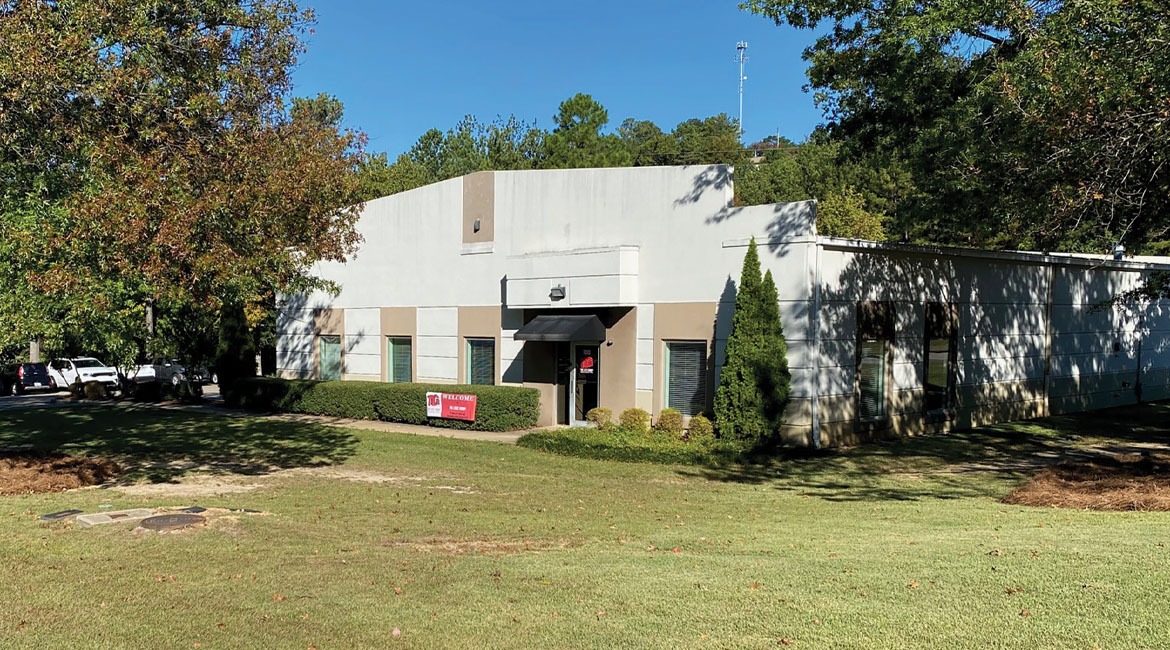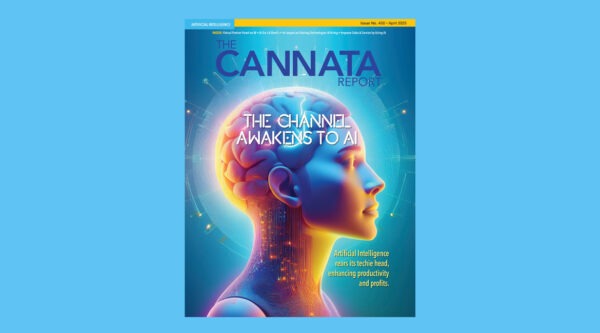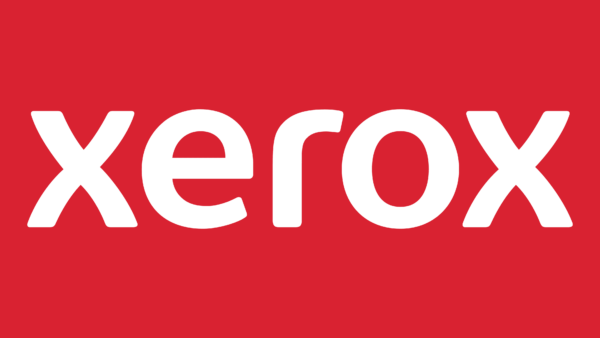
Situated in Huntsville and, now, Birmingham, Alabama, the Lioce Group (TLG) has been around coming up on 60 years. Founded in 1967 by the husband-and-wife team of Nicholas and Louise Lioce, the company first expanded its office technology offerings in the ’80s with color copiers and telephone systems.
Now 91, Nicholas still plays a weekly round of golf or three. His oldest son, Harry, owns the phone business (called Interconnect Systems Corp.), which was spun off in 1986, and his younger son, Nick, presides over the office technology dealership, which has become a third-generation, family-owned and operated business:
- Anthony, one of the current president’s sons, became COO 15 months ago (in January 2024). The Auburn University MBA graduate had served as operations manager for four years.
- Bonnie, Anthony’s younger sister, is a fellow Auburn MBA recipient who has been TLG’s federal government contracts specialist for the past three years. “By the end of the year, I think she will be our marketing VP,” her boss and proud father believes.
- Dominick, their younger brother, is a mechanical engineer (and another AU Tiger alumnus). His dad is trying to lure him from a job in Texas.
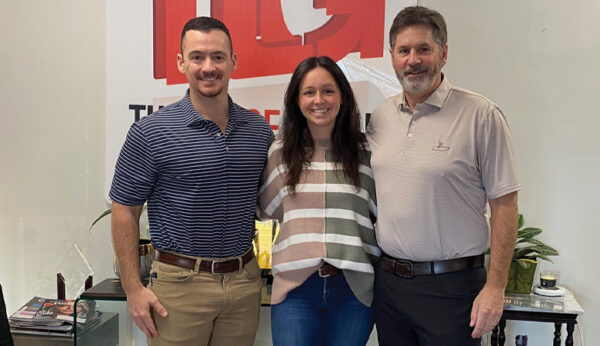
2nd and 3rd generations: Anthony (from left), Bonnie, and their dad, Nick Lioce. Grandpa Nick founded the dealership in 1967 with his wife, Louise.
A Hardware and Software Visionary
Their father foresees robots in TLG’s future. Wooing Dominick back to town is partly why Nick Lioce is heading to Detroit’s Huntington Place convention center next month to attend Automate 2025 (May 12-15). Featuring more than 800 exhibitors, the show is billed as the largest robotics and automation event in the Americas.
The way Nick sees it, “mechanical people” (aka robots) have gears and fluids that require service. “Why couldn’t we resell or lease robots to take advantage of our fleet service department?” he asks. After all, The Lioce Group was one of the first U.S. dealers to take on electric vehicle (EV) chargers. Necessary skill sets and infrastructure are in place, he stressed, allowing the dealer to go after the products and services it wants to pursue.
Past hardware additions have included barcode and label devices on the production print side as well as document scanners and audiovisual (AV) equipment. In the near future, that same philosophy could mean bringing customers innovative software solutions related to artificial intelligence (AI) and quantum computing.
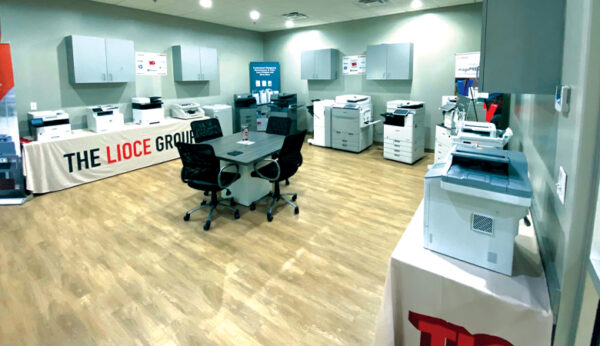
TLG’s demo floor in Birmingham, Alabama, showcases its vast technology offerings.
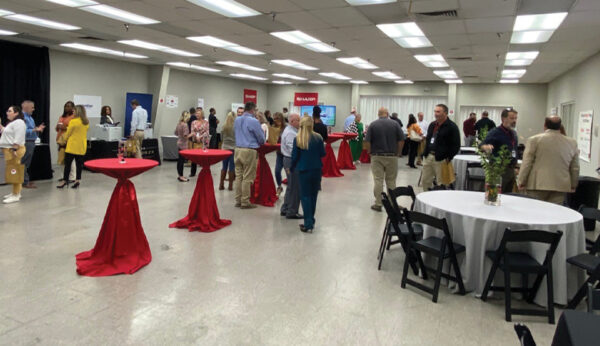
Within three to five years, the strategy also could lead to robotic equipment. “Dad never wanted to take the geographic route,” explained Lioce. “He was always about finding new products to sell to our existing client base. We’ve been a Canon partner for 40 years,” he continued, adding that the dealership also partners with Brother, HP, Konica Minolta, Kyocera, Lexmark, Sharp, and Toshiba. (See primary OEM breakdown in the dealer’s “snapshot” summary, below.)
Jay Poole is the product specialist who heads up TLG’s next-level software team, which is intently focused on automation. “Jay and his group are tasked with looking for [workflow] bottlenecks,” explained Lioce. There are about 10 programs that they can recommend: from HR to integration and inventory software.
“We see ourselves as kind of the affordable IBM consultants for small- and medium-sized businesses,” Nick continued. On the software side, they also work with Adobe, Box (in the cloud), DocuWare, Dropbox, and Microsoft among other developers. Perhaps surprisingly, TLG ranks sixth worldwide among resellers of document management software developed by DocuWare.
One of the dealer’s engineers was awarded a patent last year. Software and Integration Specialist Alex Cantrell invented EZ Meter, which is being distributed by Access Control Devices, Inc. (ACDI). It allows users to collect fleet management data, including supplies and print counts, from USB devices (without Wi-Fi connections) and send it to data collection software such as KPAX from ACDI. This addition “provides resellers [with] a powerful new solution that, for the first time, allows USB-connected printers and MFPs to be discovered and proactively managed, regardless of the number of sites, the number of customers, or the number of machines,” noted David Brown, ACDI’s senior product manager, in The Cannata Report’s recent roundup of essential software.
Open mindedness and recurring revenues aside, it is curious that Lioce has drawn the line when it comes to managed network services. That’s right: TLG does not wish to be a managed service provider (MSP). “We hate managed IT,” Nick railed frankly. “We tried it in the early 2000s and hired seven techs . . . but found that no one likes their IT company! It never panned out for us,” he recalled. Most contemporaries who’ve had success selling managed IT use “separate companies,” Lioce observed, adding that he has seen “dealers losing money over the past seven years” trying to do it.
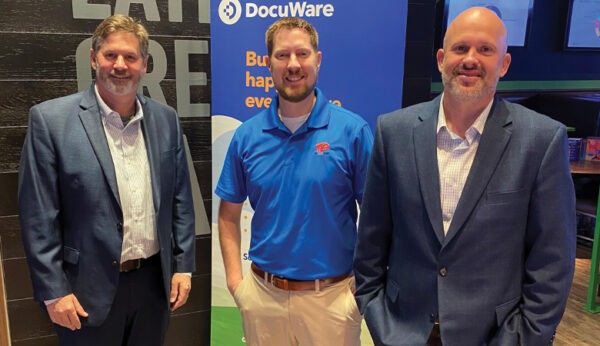
President Nick Lioce (from left,) DocuWare Team Manager Jay Poole, and Sales VP Bill Berg at a DocuWare event: The Lioce Group ranks sixth worldwide among DocuWare software resellers!
TLG is no stranger to making money. Double-digit revenue increases have been the rule, not the exception, over the past 15 years or so. Since 2022, the dealership has seen revenues jump by some 30% per annum, which is quite an impressive track record. Nick is quick to praise colleagues, including Sales Vice President Bill Berg, who has been a major force in driving growth. Berg migrated from RJ Young as a sales representative 17 years ago. Under his watchful VP eye since 2020, the Lioce’s dealership has grown by more than 200% in that five-year period while improving customer engagement and retention (99%). Two other key team members:
- Operations VP Kelley Bayer, a 40-year company veteran, is credited with ensuring that ops and administration consistently rate in the top 1% for benchmarks in the industry.
- Vince Caltagirone, the president of TLG Birmingham since 2019, brings more than 30 years of industry experience. Previously, he presided over the Stewart Organization, which is renowned for superior customer service.
As the consolidations continue within our industry, President Nick Lioce believes that strong, independent dealers will flourish. And, despite five-plus decades of TLG success and profits, he insists it’s not about the money. In fact, the firm does not set revenue goals, he noted.
“We truly care about our people,” Nick said, citing benefits such as having a corporate chaplain on site and incorporating a culture index and other tools. Don’t get him wrong: “Oh, we’re proud of our external Net Promoter Score featuring 130 five-star customer satisfaction ratings on Google,” he pointed out. “But we are even more proud to have an internal ‘Net Promoter Score’ that gauges employee satisfaction. To us, keeping our TLG team members happy at work is what it’s all about.”
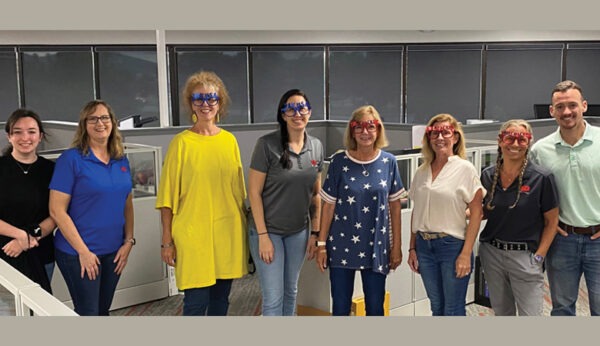
The TLG administration team celebrating during Fourth of July festivities.
TLG AT A GLANCE
Annual Sales: $33 million (up 30% year over year)
Employees: 95
Locations: 3 in Alabama (Huntsville & Birmingham; Florence is equipment only)
Number of Customers: 2,500 – 3,000
Machines in the Field (MIFs): 10,000*
*plus another 5,000 with federal government accounts)
Primary OEM Partnerships: Canon and Sharp for A3 MFPs; Brother, HP and Lexmark for A4
Federal Government Contracts
U.S. federal government sales account for a 25% chunk (more than $8 million) of TLG’s total revenues. “Between what we do with Canon, HP, Konica Minolta and the Social Security Administration [fleet of 3,000 machines], and Lexmark with the EPA [U.S. Environmental Protection Agency], we’ve placed MIFs in all 50 states,” confirmed Nick.
Lioce added that the Trump Administration’s downsizing of federal employees has been bad and good. “Some people still are panicked,” Lioce noted. However, “it is getting people back to work, which means they need equipment. The Executive Order issued directing people to consolidate the buying of goods and services through GSA [the General Services Administration] agency schedule has really helped us.”
Welcome to “Rocket City”
Since the late 1950s, Huntsville, Alabama (present population: approx. 225,000), has been a hub for U.S. technology, space, and defense industries. Huntsville became known as the “Rocket City” because it is where the Saturn V Rocket was developed that put men on the moon. The city is home to:
- U.S. Army Redstone Arsenal
- National Aeronautics and Space Administration’s Marshall Space Flight Center
- Cummings Research Park
- Missile Defense Agency
- Army Space and Rocket Command
- Army Contracting Command
- Army Test Helicopter Command
- FBI alternate HQ site (a $1-billion facility expected to grow to some 4,000 personnel)

